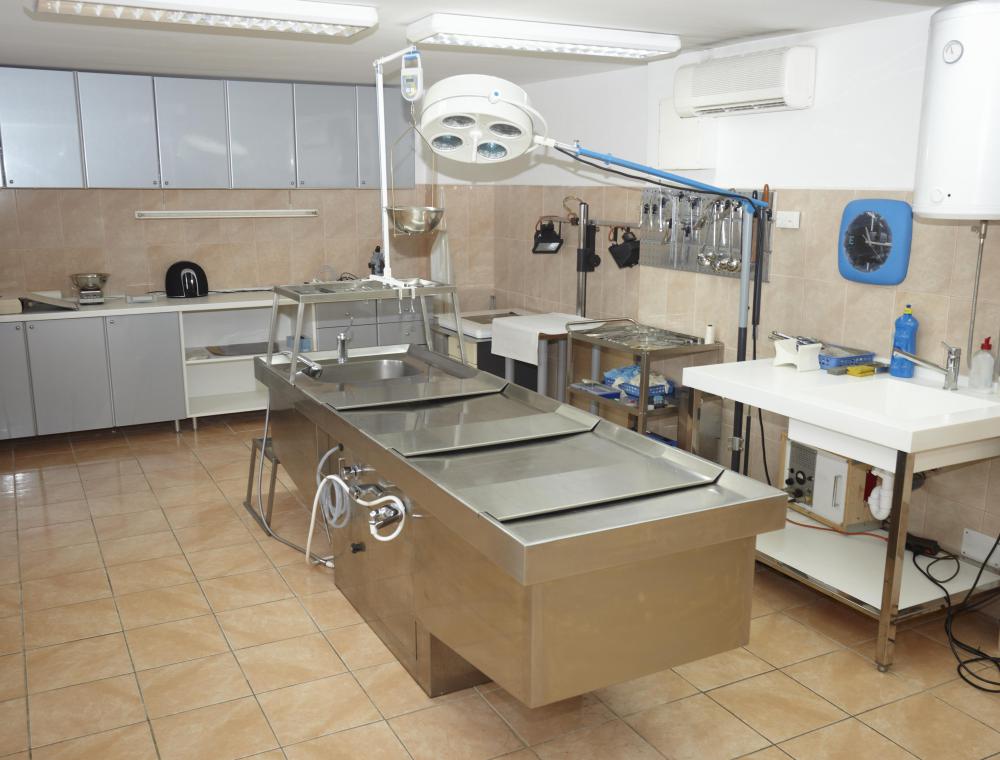At WiseGEEK, we're committed to delivering accurate, trustworthy information. Our expert-authored content is rigorously fact-checked and sourced from credible authorities. Discover how we uphold the highest standards in providing you with reliable knowledge.
How do I Become a Forensic Scientist?
Preparation to become a forensic scientist usually begins with your first degree after high school, although high school science often forms an important foundation, and specific forensic science courses, offered at a growing number of high schools, can also lay an important groundwork. The first step will usually be a post-high school degree at an accredited institution of higher education.
Though you may begin with an associate’s degree as an entry point, according to the American Society for Clinical Laboratory Science this will not be sufficient to get you the job you want or to be eligible for certification. A bachelor’s in a natural or applied science is recommended, and advanced degrees, including D.D.S. or MD may be required for particular specialties or by certain employers. Additional training is often undertaken from agencies such as the Drug Enforcement Administration (DEA) or Federal Bureau of Investigation (FBI), or from other agencies such as the California Criminalistics Institute, as well as from professional organizations.

Another consideration will be what kind of forensic scientist you are interested in becoming. Areas can be considered by job type: academic, crime scene, medical, or laboratory or by specialty. The academic field would be your choice if you want to become a professor of forensic science. If you are interested in the investigative aspects, then crime scene examiner or investigator or forensic engineer may be the job path you want to follow. The medical field is for you if you want to become a forensic scientist who is a forensic anthropologist, forensic odontologist or dentist, a forensic pathologist, a medical examiner, or a forensic psychologist, for example. And if you become a forensic scientist with a laboratory focus, your field of work could be characterized as one the sciences of biology, botany, chemistry, entomology, or toxicology, or you might focus on a particular type of evidence, such as DNA, documents, fingerprints, firearms, or toolmarks.

Forensic scientists are hired to work in a variety of venues. Academic forensic scientists are hired by colleges and universities, as well as by high schools that offer forensic science courses. Forensic scientists with a medical specialty may work for hospitals or medical examiner or coroner’s offices. Laboratory-oriented forensic scientists may work for police departments or other law enforcement bodies including government agencies, for the military, or for private companies, or as independent consultants.

Certification is a step that is recommended, but not required, for those who wish to become a forensic scientist. The Forensic Specialties Accreditation Board, Inc. is the accrediting agency that oversees the accrediting boards for forensic science. They have accredited eight agencies who meet standards for certifying forensic scientists. These eight groups are the Amercian Board of Criminalistics, the American Board of Forensic Anthropology, the American Board of Forensic Document Examiners, the American Board of Forensic Odontology, the American Board of Forensic Toxicology, the American Board of Medicolegal Death Investigators, the Board of Forensic Document Examiners, and the International Institute of Forensic Engineering Sciences.

If you wish to eventually be certified, which is recommended, but not always required, you should know what the process requires from the start. Note that different boards, because they deal in different areas, have different requirements, but ethics and safety are general requirements. The American Board of Criminalistics requires a bachelor’s degree in a natural science from an accredited institution, two years of forensic laboratory experience or teaching experience and completion of an examination for the diplomate certificate, and an additional proficiency exam and two years of experience in a specialty area for fellow certification. Certification lasts for five years, but fellows have annual proficiency tests.
AS FEATURED ON:
AS FEATURED ON:















Discussion Comments
Can a biomedical engineer venture into forensics as a laboratory expert?
Post your comments